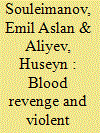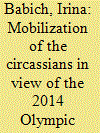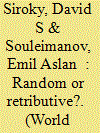|
|
|
Sort Order |
|
|
|
Items / Page
|
|
|
|
|
|
|
| Srl | Item |
| 1 |
ID:
142115


|
|
|
|
|
| Summary/Abstract |
Despite a considerable amount of ethnographic research into the phenomena of blood revenge and blood feud, little is known about the role of blood revenge in political violence, armed conflict, and irregular war. Yet blood revenge—widespread among many conflict-affected societies of the Middle East, North Africa, and beyond—is not confined to the realm of communal infighting, as previous research has presumed. An empirical analysis of Russia's two counterinsurgency campaigns in Chechnya suggests that the practice of blood revenge has functioned as an important mechanism in encouraging violent mobilization in the local population against the Russian troops and their Chechen proxies. The need to exact blood revenge has taken precedence over an individual's political views, or lack thereof. Triggered by the loss of a relative or humiliation, many apolitical Chechens who initially sought to avoid involvement in the hostilities or who had been skeptical of the insurgency mobilized to exact blood revenge to restore their individual and clan honor. Blood revenge functions as an effective, yet heavily underexplored, grievance-based mechanism encouraging violent mobilization in irregular wars.
|
|
|
|
|
|
|
|
|
|
|
|
|
|
|
|
| 2 |
ID:
118726


|
|
|
|
|
| Publication |
2012.
|
| Summary/Abstract |
When in Europe, I am often asked about my occupation at home. My answer, "I study the ethnography of the peoples of the Northern Caucasus," baffles people; most of them do not know where to look for the Caucasus on the map, however everyone recognizes the word "Chechens," an echo of the Chechen wars of the 1990s.
|
|
|
|
|
|
|
|
|
|
|
|
|
|
|
|
| 3 |
ID:
149519


|
|
|
|
|
| Summary/Abstract |
This article provides a critical examination of the current theoretical debate concerning the effects of indiscriminate violence. It argues that indiscriminate violence has been treated as an essentially random counterinsurgency tactic, but that the important distinction between its random and retributive variations has been overlooked, along with critical issues of timing and location, which has made it difficult to evaluate its efficacy in quelling rebel violence. Prior research has shown that both random and retributive violence reduced insurgent activity in the targeted locations and in the short term, but it does not necessarily follow that indiscriminate violence is effective. This article uses microlevel ethnographic evidence from Chechen villages during the period from 2001 to 2005 to show that indiscriminate violence deployed retributively against village communities generated insurgent activity in other areas because local avengers and rebels from the targeted populations sought to avoid further retributive violence against their village communities. Moreover, the insurgent activity occurred at least nine months after the initial act of retributive violence. Indiscriminate violence deployed randomly against village communities generated insurgent activity within the same targeted area, since the insurgents did not fear retributive violence in retaliation, and occurred with a delay of at least six months. As a result, the rebel reaction to indiscriminate violence is not observed immediately or, in the case of retributive violence, in the same location. This finding has crucial implications for evaluating the efficacy of indiscriminate violence in counterinsurgency operations, and underscores the importance of understanding how the social and political context can shape the way populations react to different forms of violence.
|
|
|
|
|
|
|
|
|
|
|
|
|
|
|
|
| 4 |
ID:
134280


|
|
|
|
|
| Edition |
Ist ed.
|
| Publication |
Cambridge, Cambridge University Press, 2013.
|
| Description |
xv, 306p.Hbk
|
| Contents |
B
|
| Standard Number |
9781107025530
|
|
|
|
|
|
|
|
|
|
|
|
Copies: C:1/I:0,R:0,Q:0
Circulation
| Accession# | Call# | Current Location | Status | Policy | Location |
| 057918 | 303.64/CHE 057918 | Main | On Shelf | General | |
|
|
|
|
|
|
|
|
|